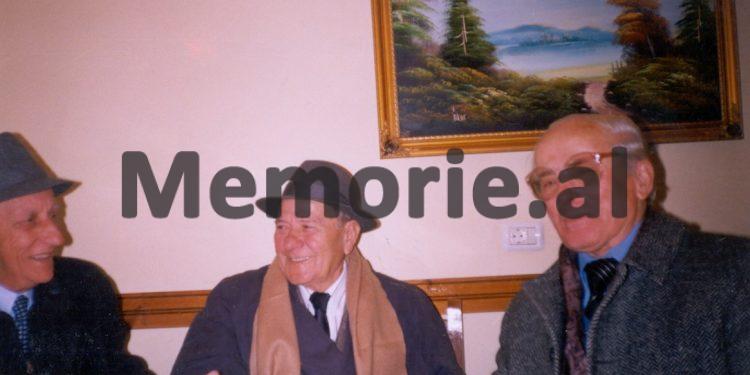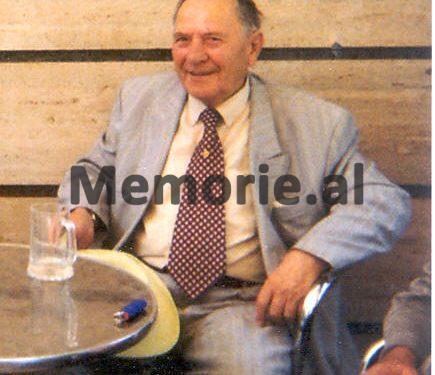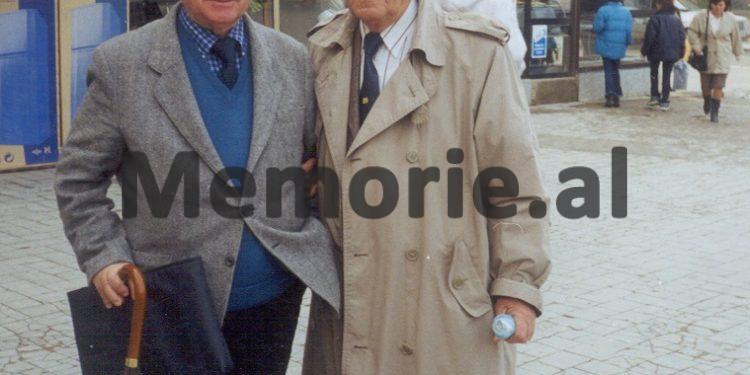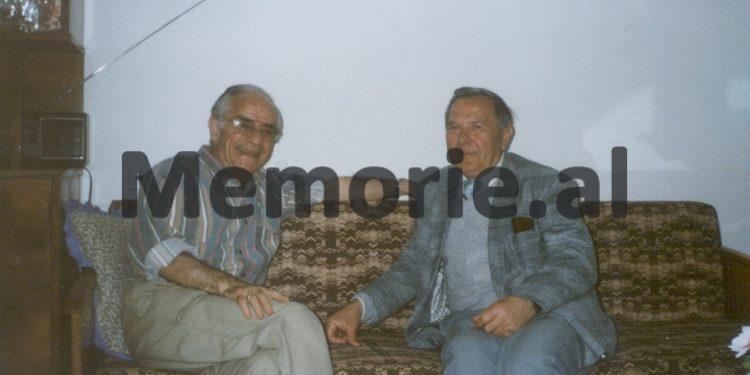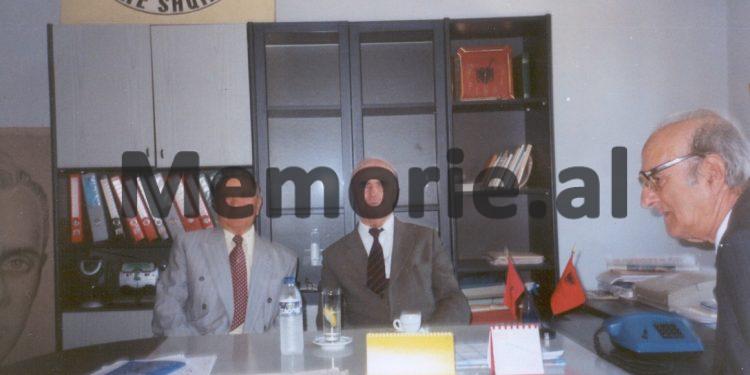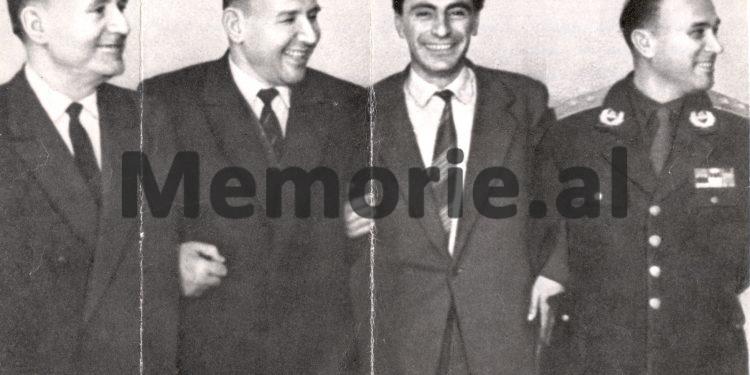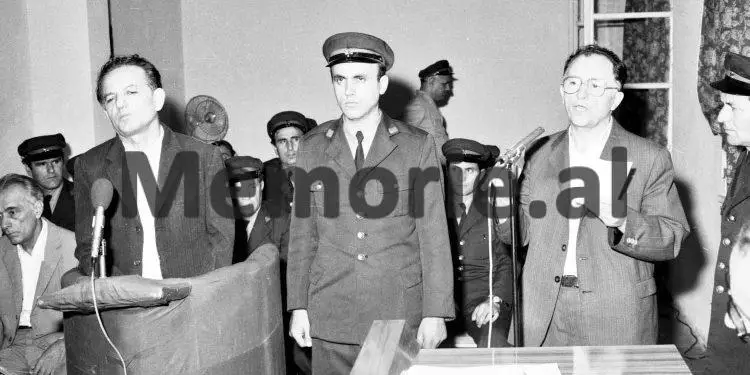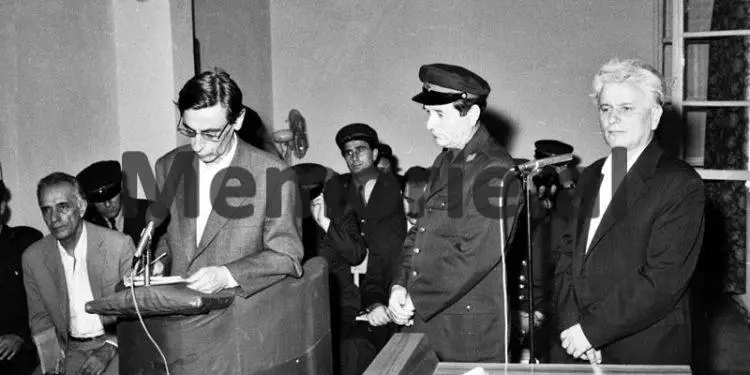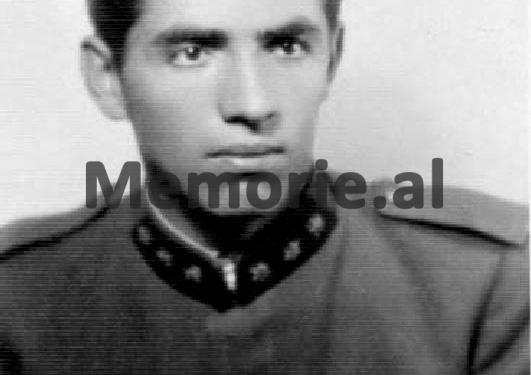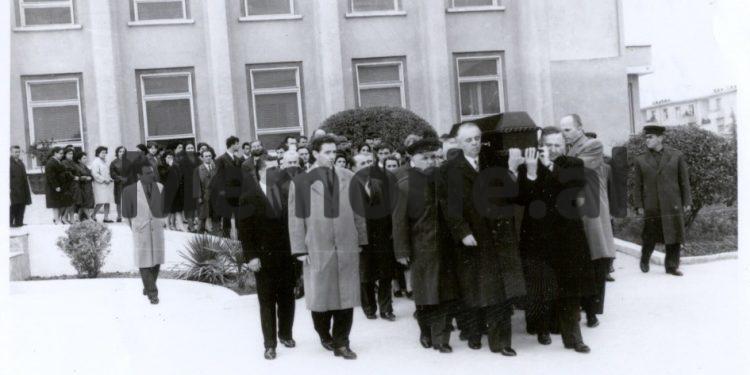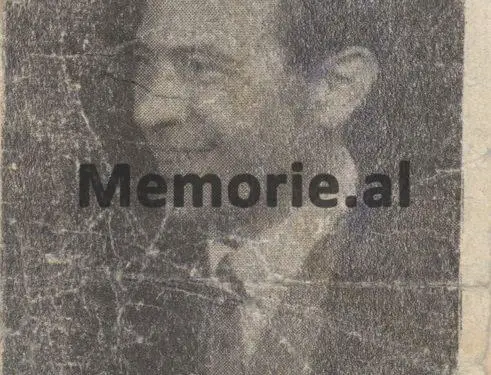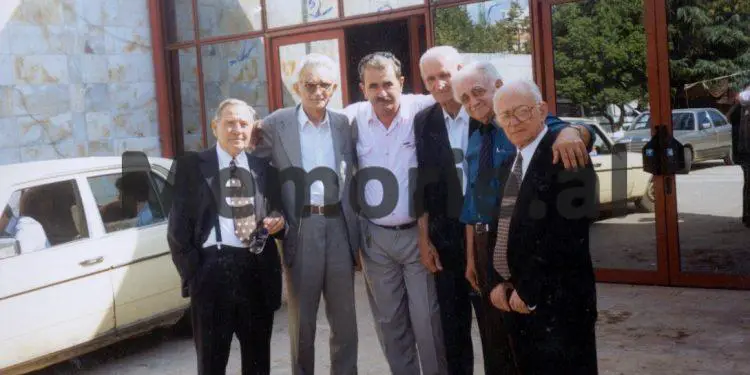Dashnor Kaloçi
Memorie.al publishes the unknown story of Ahmet Beqo Nivica, originally from the village of Kurvelesh, from where he inherited the surname, who after being educated in the Vlora Commercial, during the Anti-Fascist War was the commander of the Balli Kombëtar Youth Squads in the Region of Gjirokastra and at the end of 1944, he was able to leave Albania with some of the main exponents of the nationalist organizations of the National Front and Legality, such as Mit’hat Frashëri, Hasan Dosti, Abaz Kupi, etc., settling in Italy in camps of political asylum seekers who had opened up Anglo-Americans at the time.
Ahmeti’s departure from Italy to France together with Sadik Premten, as he was in danger of being arrested and appearing in court, accused of killing several Italian captives in Selenica, Vlora in 1943 and settling in Paris where he studied. higher graduating in Chemical-Industrial. Ahmeti’s friendship with some of the Albanian political emigrants who were in France at that time and also his closeness and very close friendship with Llambi Peçini, who performed the duty of Albanian Intelligence officer, at the Albanian embassy in Paris, disguised as a diplomat.
The repatriation of Ahmet Nivica in 1958 in Albania after an amnesty granted by the then communist regime and his appointment as head of a Commercial Enterprise in the city of Elbasan, where then the Minister of Internal Affairs Kadri Hazbiu, together with the President of The Internal Affairs Branch, Shim Kolli, called him and asked him to cooperate with the State Security organs, approaching some people who intended to flee abroad and would seek his help. Ahmeti’s refusal to work for the Security and his arrest in 1960, being sentenced to many years in prison, which he suffered in the Spaç camp from where in 1983 he was taken and brought to “Ward 313” in Tirana, asking him to testify against Kadri Hazbi and Llambi Peçini
“In the premises of prison 313 in Tirana, at that time there were also cells where Kadri Hazbiu, Feçorr Shehu, Llambi Peçini, Llambi Ziçishti, Nesti Nase, and some others who were considered their collaborators were kept isolated under strict security measures… As they were taking me to the special investigation which was a real hell of iron doors opening and closing with a frightening noise, climbing the stairs, we were confronted by an officer and a civilian who were coming down. As soon as we approached one-meter distance with the two of them, the officers accompanying me stopped me and turned me on my back, so that we would not look at each other. “But I recognized very well the man who was the former chief investigator of the Republic, Nevzat Haznedari.” The man who speaks and testifies for Memorie.al, is Ahmet Nivica, former commander of the Youth Front National Squads during the War years and then a political emigrant in Italy and France until 1958, who recounts his entire adventure with senior State Security cadres asking him to testify against former Security Director for senior leadership Llambi Peçini and Interior Minister Kadri Hazbiu.
Who is Ahmet Nivica and what activity did he carry out during the years 1949-1958 when he was a political emigrant in France? What did the secret services of some western countries ask of him and why did they make it his primary task to recruit the first secretary of the Albanian embassy in Paris, who then returned to Tirana and for many years held high positions in the Security of State? What were they talking about in the Paris cabaret until late at night, the Albanian political emigrant, with his compatriot, who was actually acting as Chief of Security, but camouflaged under the guise of a diplomat? What did they ask each other and why did Ahmet Nivica persuade to return to Albania in 1958? Who received him at the Rinas airport, what statement did he give to the journalist Petrit Mullisi and who were the people who first visited him in the hotels “Volga” and “Dajti”?! Where did Ahmet Nivica settle down and what were his relations with Llambi Peçini, the former diplomat of the Albanian embassy in Paris, who after returning to Tirana, became the right wing of Mehmet Shehu and Kadri Hazbiu? What did Kadri Hazbiu and Shim Kolli ask Ahmeti in 1963 and why did he refuse to serve them?
follows from the previous number
Mr. Ahmet, how long did they keep you in Tirana and where did they take you afterwards?
In Tirana I was kept for about a month in “Volga” and “Dajti”. Then I was removed from Tirana and put to work as a technologist in a food company in the city of Elbasan. “They did this to me after I graduated as a chemical engineer at the University of Paris (Berlitz school).”
During that period, you settled in the city of Elbasan, were you monitored by the State Security?
From the day I settled in the city of Elbasan, in the spring of 1958, until the day I was arrested in December 1966, I was constantly under strict State Security surveillance. Even my assignment to work in the Food Company of Elbasan, was done in order for them to have in front of my eyes every day and not to get tired of following me up and down the fields of Myzeqe in the internment camps.
You had the right to move from Elbasan, so were you free at all or…?
No, they had forbidden me to go out of the city of Elbasan without first obtaining written permission from the Internal Affairs Branch. To be on the safe side, they did not provide me with a notification letter and any other kind of document like all other citizens did. They did not provide me with a notification letter even after 1960 when I got married and started a family in Elbasan.
At that time, did you have the opportunity to meet Llambi Peçini, your old friend?
I met Llambi Peçini when I came to Tirana especially for him. But there were cases when I was followed by the people of the State Security and sent back to Elbasan. I complained to Llambi about this and he told me: “They are jokers, they do it from their own head. Go and complain to the First Secretary of Elbasan, Thoma Deljana”.
For what reasons did you meet Llambi Peçini at that time and what was his duty?
I was at that time a man without any kind of support and based on the constant surveillance that was done to me by the State Security, I thought that I had support for any kind of eventuality. In those years Llambi was assigned to a very important task, being the chairman of the Security Branch for senior leadership. Llambi was one of Kadri Hazbiu’s closest friends and in most cases when I came to meet him in Tirana, I found him at the “Dajti” Hotel.
Until when did you maintain your friendship with Peçin and did you have any disagreement with him at that time?
With Llambi I maintained the friendship until the time I was arrested. As for disagreement I can tell you a case. In the summer of 1960, from the Internal Affairs Branch of Elbasan, I was informed to go to Tirana because Peçini was waiting for me. When I went to the Ministry, I introduced myself and a woman introduced me to a hall telling me not to worry that the Lamp would be coming soon. I waited from 9am to 1pm and since he was not coming, I thought things were bad, as they would not even let me leave from there.
Did the Lamp come or was it some Security trick?
The lamp came there at 1pm. He was very sweaty and looked like he had been fighting. He took me from there and took me to a separate room, where after we exchanged words of courtesy he said to me: “Are you Ahmeti I know”. I was answering you. He continued: “Have you collaborated with any group here in Elbasan?”. No, I answered. He continued again: “Someone spoke to you against the Party, or invited you to a ceremony. I called you for these. If you have anything to say, otherwise your head will go away.” After those words I told him that I had not talked to anyone and it was Ahmeti who knew me.
In fact, did you talk to anyone?
In fact, I had conversations with the Chairman of the Executive Committee of Elbasan, Tahir Demi and the Chairman of the Branch, Shim Kolli, who asked me about each other. Tahiri told me what I had talked to Shimi and Shimi what I had talked to Tahiri. But I did not tell Llambi Peçini about these at all. So, I parted with Peçin and I returned to Elbasan. When I went home I found the woman together with her brother from Berat, who were very alarmed. They told me that rumors had spread throughout Elbasan that the “Teme Sejko Group” that had been arrested that day had been spied on by a man who had come from abroad. For this, I took my wife and brother-in-law and we went out on a tour and then to a park so that everyone could see that I had not been arrested.
Who was the man who was said to have spied on Teme Sejko’s group?
They were said to have spied on a Cham who had come from Belgium in those days, after committing an ordinary murder there. “He was arrested on charges of being part of that group and later sentenced to 17 years in prison and died in the Ballsh camp.”
Were you in danger of being arrested with Teme Sejko’s group?
I was in danger and Llambi himself told me this afterwards. He told me that during the investigation, Tahir Demi and Shaban Ademi had testified, saying: “We tried hard to recruit Ahmet Nivica, but he refused.” At least that was said, but they could also be games and machinations made by the State Security itself.
Given the fact that has already been made public, that Teme Sejko Group, was a game hatched by Kadri Hazbiu, do you believe what Peçini told them at that time?
I believe it, because I had many conversations and offers from Tahir Demi and Shabani to go to Konispol, and to connect them with Haki Rrushti who came from the US to Greece. I do not know the games played by Kadri Hazbiu, but I am telling you that the group of Teme Sejko and Tahir Demi were real patriots who demanded the freedom of Chameria.
We are returning once again to the questions that were asked in the Special Investigation for Llambi Peçini and Kadri Hazbiu. How long did they keep you there and what did they say about them?
They called on me to implicate Kadri with Llambi, saying: “Call to mind, we need you very much. They put you in prison, now take revenge on them.”
How did you respond?
I told them that I had nothing to speak about, since Kadriu had been a Minister and General Llambi, how could they talk to me. I could not be a witness against them, because if I did that, they would execute me immediately after my testimony, because until then I needed them. These were clear agency schemes and I could not make such a mistake as it was played with the head.
Did you actually know anything concrete about them, about what the investigator was asking you to do?
In fact, I knew something about Kadri Hazbi and especially about Peçin, because I had learned them from the foreign secret services when I was in France. But I could not say that to the investigator, because I could not become a spy, either for the Security or for the foreign services. That was not in my character. After calling me five or six times, they told me: “Now leave and as far as you heard here, do not talk to anyone because it is a state secret and you will lose your head.” I told them, here is where you have me connected now, because I cannot keep the secrets of Kadri and Peçin. As I went to the barn, I told my friends what I had been told by the investigator, and this cost me dearly, as I was treated barbarically there in the bunker.
How long did they keep you there?
They held me there for about a month and sent me back to the Spaç camp, where in August 1983, a Security officer from Tirana came and asked me to testify against Kadri and Llambi, but I refused, saying that I had been called once in Tirana about that and I had not said anything. He insisted on knowing about Pecin’s connections in France with a priest named Abbe. Related to this priest was another Albanian named A. M. who was repatriated to Albania two or three days after me in April 1958. This man was executed years later by the State Security, poisoning him in a hospital in Tirana, maybe from Kadriu or Peçini, I am not sure about that.
Did you tell all this to the investigator?
About these I could not talk, as they were dice games to get the head. So the Security Officer who came to me in Spaç, after using all the tricks, escaped without receiving any response, while I remained in prison until the end of 1990, spending more than 20 years in the prisons of the communist regime of Enver Hoxha./Memorie.al




